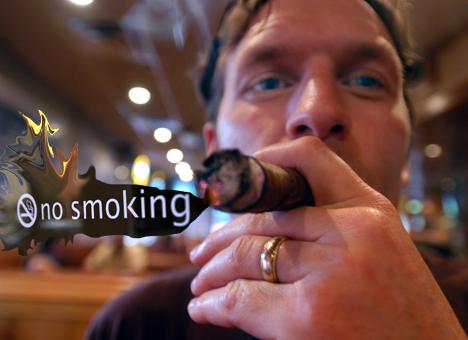Butts out C-U: Bar owners pledge fight
June 12, 2006
The mood was relaxed and amiable at the Esquire Lounge on a cool Wednesday evening. Men sat in booths puffing on cigars and sucking on the occasional pipe as swirls of smoke hung lazily above their heads.
But one mention of the recently approved smoking ordinances in Champaign and Urbana and their mood became as acrid and gloomy as a plume of smoke from a lit cigarette.
Pat Callaghan, owner of Jon’s Pipe Shop, 509 E. Green St., shook his head as he sold cigars to patrons in the bar.
“The bar crowd is a group that tends to be smokers or smoker friendly,” Callaghan said. “Economically, this is a disaster for the bars.”
Callaghan, like many bar owners, perceives the bans as a direct threat to business, even his own store.
Get The Daily Illini in your inbox!
“Where are people going to smoke my product? A lot of my customers buy cigars to go out with their friends … where are they going to go?”
Scott Hays and Daniel Lewart, the key proponents of the ordinances, could not be happier.
“We were elated” when the ordinance passed, Hays, founder and president of C-U Smokefree Alliance said. “We basically interrupted the (Champaign City Council) meeting with shouts and cheers.”
Lewart echoed Hays feelings for the Urbana ordinance.
“I feel very good about it,” Lewart, the vice president of C-U Smokefree Alliance said. “This is a great historic day for Champaign-Urbana and shows that city councils care about public health.”
The ordinances prohibit smoking in a number of public places: from ballrooms and bowling allies to grocery stores and gymnasiums. Most notably, and contentiously, the bans include restaurants and bars.
Several exemptions are given, such as outdoor seating at establishments and retail tobacco shops.
Those caught violating the ordinances face stiff fines, ranging anywhere from $135 to $195 depending on the city or offense.
As of now, the ordinances are slated to take effect for all establishments on Aug. 1. However, a last minute amendment adopted by the Urbana City Council pushed the effective date for bars to Jan. 1, 2007. If or how this will alter the Champaign ordinance, which states it will take effect 30 days after Urbana’s does, remains to be seen.
Supporters say the ordinances will benefit businesses both economically and medically.
Allen Strong is the owner of two smoke free restaurants in Urbana: Silvercreek, 402 N. Race St., and Courier Cafe, 111 N. Race St.
His first place, the Courier Cafe, was originally a smoking restaurant, and after years of wear and tear from the smoke stains, dealing with non-smokers’ complaints and trying in vain to separate the smoking and non-smoking sections, Strong opened Silvercreek as Illinois’ first smoke free restaurant in 1990.
“It’s kind of like having a ‘no peeing’ section in a pool,” Strong said about creating smoking and non-smoking sections.
The gamble paid off, and he recently made the Courier Cafe smoke free, too.
For Strong, the economic doom predicted by other restaurateurs is overblown and healthier customers and employees will eventually thank owners for the change.
“It became so overwhelmingly the choice of customers that it was just the clear thing to do.” Strong said. “And the fact that it’s just a nicer environment.”
Seated in Murphy’s Pub, Claire Feeney, senior in Communications, also welcomed the ban. As a non-smoker and a campus bar employee, Feeney is looking forward to her new work environment.
“People will still go out the bars, people will just complain about it more.” Feeney said.
Brenda Faul, an Urbana resident, disagreed. Smoking Virginia Slims at the Illini Inn, 901 S. Fourth St., the news made her worried for the bar owners’ future.
“I think it’s really sad that a few members were able to make the decision for every resident of Champaign-Urbana and the bar owners,” Faul said. “I know I’m going to stop going to the bars in January when it becomes effective because I can smoke and drink in my house.”
Even though the bans have passed, the smoke has yet to fully clear the room. Crucial questions on who will enforce the ordinance, how will it be enforced and what are the obligations of owners are tricky to answer. Both the Champaign-Urbana Public Health District and the police departments have expressed reservations about their roles.
Another question is the uncertain future of Champaign’s hookah bars, Nargile, 207 W. Clark. St., and Green Street Cafe, 35 E. Green St. With a business explicitly built around allowing its customers to smoke, the economic impact of the ban could be disastrous. Ken Pirok, a Champaign City councilman, suggested an exemption for the bars after the ordinances passed, only to have it fail.
“I hope they can find a way to adapt,” Pirok said. “I think there is no doubt that it (the ordinance) will affect their business adversely.”
Also, rumors of retaliation have circulated in the community. Some bar owners pledge to fight the ordinances, asserting that the councils’ votes were not the last word on the issue. Some smokers even advocated committing acts of civil disobedience by boldly lighting up in their favorite hangouts.
“We are definitely not done fighting. We are not just going to lie down and let them dictate our business when they really don’t have a clue on how things work around here,” said Scott Glassman, owner of Crane Alley in Urbana, 115 W. Main St.
Conversely, Hays pledges his support to all council members who voted for the bans and is convinced that the ordinances will stay.
“We’re confident that this issue is over,” Hays said.







